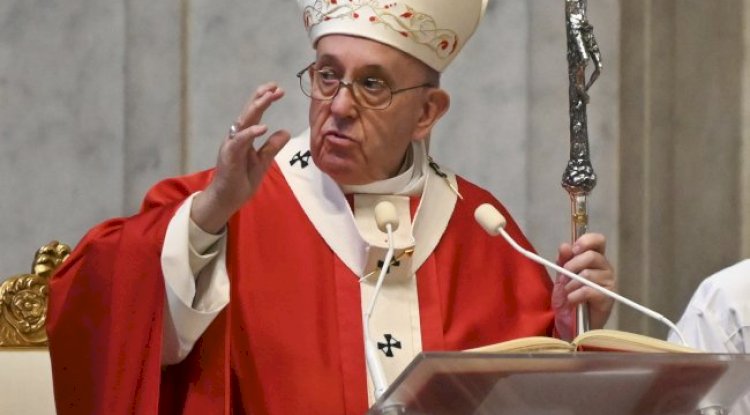'Confront Pagan Elements Of Secularism', Pope Francis To The Church


Pope Francis has described secularisation as a “complex phenomenon” and how the Church must “confront forms of paganism” within it.
His comments have come to light following his 28 September meeting with 150 of his brother Jesuits in Brussels, Belgium – one of Europe’s most secular and aggressively progressive countries – during which the pontiff answered a question from a Jesuit member living in Amsterdam, one of the most secularised cities in the world, reports Crux.
In his reply, which were published in La Civiltà Cattolica on 8 October, Francis noted that he didn’t mean a paganism like the one found in the ancient world, explaining:
“We do not need a statue of a pagan god to talk about paganism,” the Pope said. “The very environment, the air we breathe is a gaseous pagan god! And we must preach to this culture in terms of witness, service and faith. And from within we must do it with prayer.”
“There is no need to think of very sophisticated things; think of St. Paul in Athens,” the Pope continued, giving the example of how Paul went to Greece and preached in Athens, pointing out to the locals their ignorance of the true God and their worship of idols.
At the time, Athens was a city steeped in pagan culture and philosophy, while the Athenians were proud of their city’s cultural and intellectual achievements. Paul’s message was met with skepticism and even hostility; however, some Athenians did follow Paul’s preaching, and the city eventually became a significant centre for early Christianity.
In making his comments, the Pope may have been thinking of the situation surrounding him in Italy these days. A startling number of lapsed Catholics in Italy are reverting to the deities of ancient Rome and turning to pagan seers, astrologers and psychics, attesting to a potentially catastrophic collapse of Catholicism in its traditional bastion.
Over 160,000 sorcerers are doing brisk business in the occult and New Age practises, with over three million Italians consulting the so-called “maghi” every year for advice. This involves shelling out an astronomical €8 billion, according to data from the Osservatorio Antiplagio.
Between 10 to 13 million Italians – almost all of them baptised Catholics – have turned to sorcerers or witches at least once in their lives; while 30,000 Italians from all classes of society seek out psychics and visionaries daily, in a quest for a better future, the Codacons agency states.
The epicentre of witchcraft and occultism is in the Lombardy region of northern Italy, with 2,800 occult operators and 200,000 clients – numbers that far exceed the percentages of resident Catholic priests and Catholics who attend Holy Mass on a weekly basis.
A survey conducted in 2023 by the market research company SWG found that 34 per cent of Italians believe or engage in necromancy, 24 per cent in black magic, 19 per cent in predicting the future with cards, 18 per cent in white magic, and 17 per cent in psychic or occultic healers.

In 2019, Pope Francis warned Italians “not to seek happiness by following smoke vendors – who are often vendors of death – experts in illusion”, a reference that was interpreted by Italian media as a caution against the proliferation of witchdoctors.
RELATED: Italian Catholics reverting to ancient Roman gods, seers and sorcerers
As Herald columnist Gavin Ashenden raised earlier this year, the relentlessly enraged crowds, protestors and activists on display these days, often steeped in what appears close to psychosis, is enough to make one wonder: “Are the dark gods back?”
“The ideologies or the spirits that we see captivating the crowds of the enraged appear to be characterised by a visceral repudiation of the idea of the One God and his ethical values, accompanied by a determination to hyper-sexualise the whole culture and an indomitable will to sacrifice and celebrate the sacrifice of our children (both beyond but especially in the womb),” Ashenden writes.
“The dark gods or spirits appear to be back in force. We will need more than rational arguments to drive them out of hearts, heads and hysterical crowds.
“We will need the same devotion to Jesus, to prayer, to sacrifice and courage that the early Church employed in its first repudiation of the evil that so powerfully captures and dominates the human condition.
In what could be taken as another sign of the fading influence of Catholicism in Ireland, along with a resurgence of its pagan past, a new study shows only 35 per cent of marriages took place in the Church last year – a drop from over 90 per cent of marriages just 20 years ago – with increasing numbers opting for spiritual-themed weddings.
Published by the Iona Institute, an Irish organisation promoting the place of marriage and religion in society, the study said many couples are now marring in civil ceremonies, but many – “incredibly almost a quarter” – are happening in what it describes as “New Age” settings.
One example of a non-traditional wedding provider that couples are seeking out is a group called Entheos, which was established by founder Karen Dempsey – also known as ‘the Bald Priestess’ – during the COVID lockdown of 2020 and submitted to Ireland’s Office of the Registrar General as an “inclusive, non-denominational religion”.
Would-be celebrants wishing to use Entheos’ services have to commit to challenging “heteronormativity, racism and homophobia”. The organisation now has 65 celebrants, says the Iona Institute report.
In 2023, Entheos carried out 623 weddings, far more than the 242 that the Church of Ireland celebrated. Another provider, FuturFaith, also celebrated its first wedding only in 2021 but conducted 78 weddings in 2023.
What's Your Reaction?













